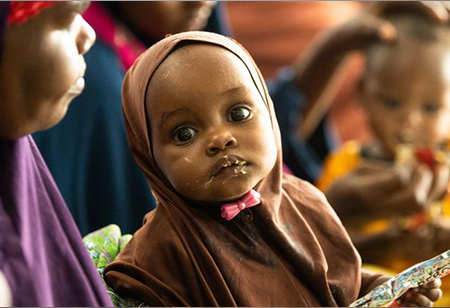
Why is the World Hungrier in 2023 than Ever Before?


There is always a link between the nation's food supply, economy, and the healthcare system. Developing countries are constantly affected by the global food crisis. Even before the Russian-Ukrainian incursion, there were food insecurity issues. According to reports, the latest global food crisis roots back to 2018. India, the third-largest producer of onions after China and the United States, is currently experiencing a production shortfall.
Shortage of Food Grains
Wheat and grain prices have decreased recently, allaying concerns about the affordability of some necessities. But getting enough calories daily is not enough; one should consume enough nutrients too. An important link between nutrition and food security is diet quality. Malnutrition can take many different forms when diet quality is poor. But several factors are currently upending the vegetable market, which is the basis of a wholesome, sustainable diet. And the common onion is at the pointy end of it.
Costs are increasing, causing inflation and pushing nations to take measures to safeguard supplies. Morocco, Turkey, and Kazakhstan have blocked certain food exports. The Philippines has asked for a cartel inquiry. This month, the United Nations and the World Bank warned that restrictions had expanded beyond onions to include carrots, tomatoes, potatoes, and apples, hindering access globally. Following a subpar crop in southern Spain and North Africa, empty shelves in Europe have led UK retailers to restrict purchasing some varieties of fruits and vegetables.
The most popular vegetable consumed after the tomato, which is technically a fruit, onions are a mainstay of cuisines all over the world. The annual production of about 106 million metric tonnes is equivalent to the combined production of carrots, turnips, chilies, peppers, and garlic. In the US, where futures trading in them have been forbidden since 1958 due to an attempt to corner the market, they are used in everything from the base seasoning of curries and soups to the fried toppings on hotdogs. The price increase is a result of devastating floods in Pakistan, frosts that destroyed stockpiles in Central Asia, and Russia's conflict in Ukraine. However, farmers in North Africa have seen severe droughts and a rise in the price of fertilizers and seeds.
Causes for Onion Crisis
Moroccan farmers have been particularly hard-struck by the bad weather. People are seeing outrageously high vegetable prices in a market in the Ocean area of central Rabat, despite the government's recent restriction on exporting onions and tomatoes to West Africa. Since Muslims usually break their daily fast with a substantial meal before celebrating the Eid festival, that financial squeeze will be even more noticeable during the coming eid. Vendors now find it disheartening to see customers who have been frequenting a particular stand for 10, 15, or 23 years groaning request one tomato, one onion, or one potato.
In the Philippines, a shortage of onions has exacerbated recent shortages of everything from salt to sugar. They briefly cost more than meat due to excessively high prices, and flight attendants were recently busted smuggling them out of the Middle East.
Kazakhstan's trade minister warned citizens not to buy onions by the sack amid a panicked rush to grab supplies at neighborhood supermarkets. The country's officials have been forced to draw from strategic stocks. This comes from an export prohibition recently enacted by Kyrgyzstan, Uzbekistan, and Tajikistan. Because of its onion-heavy national dish, Qurutob, Tajikistan is the world's top consumer per capita. Azerbaijan is imposing a restriction on sales elsewhere, while Belarus will grant exports a license.
Healthy diets are becoming increasingly out of reach as the price of nutrient-dense fruits and vegetables rises, and wages find it difficult to keep up. According to the most recent UN statistics, more than three billion people cannot afford balanced food. The nutrition time bomb is gradually exploding, increasing the political agenda worldwide and making nutrition a much bigger consideration in government policy.
People should be concerned about the current issue due to the general rise in malnutrition, not simply the horn of Africa's precarious famine situation. On a worldwide scale, nutrition was already shockingly poor.
There is now little support for vegetable growers, although many governments will gladly subsidize imports of wheat or flour to keep their citizens happy. As a result, more sugar, vegetable oils, and starchy grains are produced globally than tomatoes and onions.
Onions, like bread, have the capacity to spark civil strife. High costs were cited as why the Bharatiya Janata Party lost the election in New Delhi in 1998 in India, a country that had intermittently restricted exports for years. Twenty years later, Prime Minister Narendra Modi declared that farmers are his top priority, which stands for tomato, onion, and potato. The principal grains play a significant role in the functioning of hunger and food security worldwide.
Zero Hunger by 2030
After a long time, the whole world is facing a food crisis, and it is time for countries to work towards zero hunger by 2030. To boost productivity and income, smallholder farmers must adopt innovative, sustainable agricultural practices. An environmentally conscious strategy that makes the most of technological advancement and generates steady and fulfilling employment opportunities is needed to ensure the sustainability of rural communities. But even for people who experience misery and conflict, jobs and economic prosperity are insufficient. Beyond just focusing on economic development and conflict resolution, Zero Hunger adopts a long-term strategy to create inclusive, peaceful societies.
Working together to ensure that everyone, everywhere, has access to the safe, wholesome, and nutrient-rich food they require is the only way to end hunger. In order to do this, we must live more sustainably, collaborate with others, share our knowledge, and be prepared to change the world for the better.